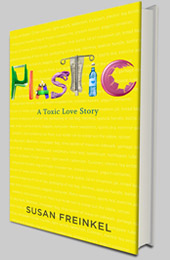plastic
REviews
Hawaiian writer Stuart Coleman discusses the book and his own
experience with plastics addiction in this cover story in the
Honolulu Weekly: Plastic Fantastic Love
"a thoroughly researched, engaging read." —The Australian read full review
"Pick up Plastic and get an education on the impact of plastic and what we can do to confront this crisis." —Pure Politics.com read full review
OnEarth, "Plastic: A Toxic Love Story in Pictures"
"A fascinating book" —Brisbane (Australia News)
"A delightful read." —Sydney (Aus.) Morning Herald
"Freinkel has achieved something truly admirable in this dispassionate but also engrossing and often lyrical book..a surprising piece of research that makes unforgettably plain how in just the past half-century plastic has transformed our world for good as well as ill.” —ProgressiveReader.com read full review
What is plastic, really? Where does it come from? How did my life become so permeated by synthetics without my even trying?" Surrounded by plastic and depressed by the political, environmental, and medical consequences of our dependence on it, Freinkel (The American Chestnut) chronicles our history with plastic, "from enraptured embrace to deep disenchantment," through eight household items including the comb, credit card, and soda bottle (celluloid, one of the first synthetics, transformed the comb from a luxury item to an affordable commodity and was once heralded for relieving the pressure on elephants and tortoises for their ivory and shells). She takes readers to factories in China, where women toil 60-hour weeks for $175 a month to make Frisbees; to preemie wards, where the lifesaving vinyl tubes that deliver food and oxygen to premature babies may cause altered thyroid function, allergies, and liver problems later in life. Freinkel's smart, well-written analysis of this love-hate relationship is likely to make plastic lovers take pause, plastic haters reluctantly realize its value, and all of us understand the importance of individual action, political will, and technological innovation in weaning us off our addiction to synthetics. (Apr.) [publishers weekly]
—Publishers Weekly
When you write about something so ubiquitous as plastic, you must be prepared to write in several modes, and Freinkel rises to this task: Sometimes "Plastic" is a work of cultural history; sometimes, a work of business reporting; sometimes, an environmentalist screed. Where Freinkel is perhaps most at home is as a science writer. She manages to render the most dull chemical reaction into vigorous, breathless sentences. read full review
—San Francisco Chronicle
"Susan Freinkel had me from the minute I finished reading about her attempt to try to live without plastic for a week...Ms. Freinkel has penned a fascinating—and at times extremely disturbing—book about material that has literally invaded and, as her research reveals, infected every aspect of modern life."
–New York Journal of Books
"I have rarely, if ever, come across a book that I would describe as "perfect." However, after finishing Plastic, I was convinced that the appellation might well be accurate, not only for American Chestnut, but possibly for Plastic as well."
–James Arnett, The Brooklyn Rail
"Evenhanded investigation."
–Salon
"It's impossible to read her book without developing an appreciation for and a concern about the role that plastic plays in our lives."
–The Columbus Dispatch
"Exhaustively researched and extremely readable, this eye-opening book has the potential, even, to influence a cultural change."
–Kelly Roark, NewCity Lit
"Plastic: A Toxic Love Story forces you to reexamine the role of plastics in our lives...A fascinating saga"
–Huffington Post
"This is an important book, a thorough dissection of the complexities that today's plastic world presents. More than that, it's flat-out fascinating, each chapter more compelling than the last."
–Philadelphia Inquirer
Susan Freinkel's book, "Plastic: A Toxic Love Story" is evenhanded, thorough, riveting and often lyrical. It is also full of eccentric human players. She writes what so many of us know but haven't found words for: "We take natural substances created over millions of years, fashion them into products designed for a few minutes' use, and then return them to the planet as litter that we've engineered to never go away." read full review
—Cleveland.com
For someone who confesses that she began her research “knowing really nothing about plastics,” Susan Freinkel has put together an insightful, unbiased, fascinating look at how plastic products have become so pervasive in our lives, and why their continuing explosive use has raised so many unanswered environmental, waste and health concerns. read full review
—Plastics News
Susan Freinkel’s “Plastic: A Toxic Love Story” is one of those books that can change your life. Chances are, you’ll wake up wondering what’s in your mattress, and then again the carpet fibers as you wander into the bathroom. The toilet seat is made of plastic, you suddenly realize. Brushing your teeth, you’ll pause… what kind of plastic is in that toothbrush?…Exhaustively researched and extremely readable, this eye-opening book has the potential, even, to influence a cultural change. read full review
—NEWCITY Lit
What makes Plastic: A Toxic Love Story such a compelling--and troubling--read, is her honest assessment of plastic's finer attributes, which largely get ignored in the debates over those much-despised flimsy shopping bags and single-use water bottles. read full review
–AlterNet / By Kerry Trueman
Photo (bottom, right): Judith and Richard Lang (detail: Micky's Monkey 2008)

